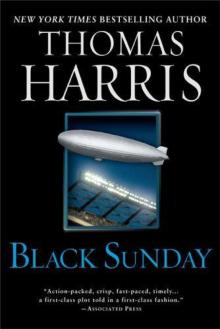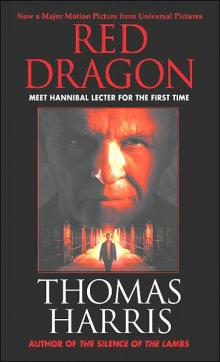- Home
- Thomas Harris
Black Sunday Page 14
Black Sunday Read online
Page 14
Sitting with their backs against a rock, they watched the sun come up. In the light of that clear day, Kabakov could see the tiny flaws in her complexion, the freckles, the lines of fatigue beneath her eyes, the good cheekbones. He wanted her very much and time had run out.
He kissed her for minutes, his hand warm beneath her hair.
A couple came down the path from the thickets above, bashful in the light, brushing leaves from their clothing. They stumbled over the feet of Kabakov and Rachel sitting beside the path, and passed on, unnoticed.
“David, I am shook,” Rachel said at last, shredding a blade of grass. “I didn’t mean for this to get started, you know?”
“Shook?”
“Disturbed, upset. Slang.”
“Well, I—” Kabakov tried to think of a nice phrase, then snorted at himself. He liked her. Talk was nothing. Damn talking. He talked. “Wet drawers and vague regrets are fifth-form nonsense. Come with me to Haifa. I can get a week’s leave. I want you to come with me. We’ll talk about your responsibilities next week.”
“Next week. Next week I might not have any sense at all. I have obligations in New York. What would be different about it next week?”
“Knocking the slats out of a bed and lying in the sun and looking at each other would make it different.”
She turned away quickly.
“Don’t get pissed off, either.”
“I’m not pissed off,” she said.
“Stop saying words like pissed off, then. It sounds like you are.” He was smiling. She smiled too. An awkward silence.
“Will you come back?” Kabakov said.
“Not soon. I have my residency to finish. Not unless the war breaks out again. But it hasn’t stopped for you, not even for a little while, has it, David? It’s never over for you.”
He said nothing.
“It’s funny, David. Women are supposed to have busy little flexible lives, men have Their Duty. What I do is real and valuable and important. And if I say it’s my duty, because I want it to be my duty, then that is just as real as your uniform. We won’t ‘talk about it next week.’ ”
“Fine,” Kabakov said. “Go do your duty.”
“Don’t get pissed off, either.”
“I’m not pissed off.”
“Hey, David, thank you for asking me. If I could, I would ask you. To go to Haifa. Or somewhere. And knock the slats out of a bed.” A pause, then quickly, “Goodbye, Major David Kabakov. I’ll remember you.”
And then she was running down the trail. She did not realize she was crying until her jeep picked up speed and the wind spread the tears in cold patches on her cheeks. Tears the wind dried, seven years ago, in Israel.
A nurse came into Kabakov’s room, interrupting his thoughts, and the hospital walls closed in on him again. She carried a pill in a paper cup. “I’m going off now, Mr. Kabov,” the nurse said. “I’ll see you tomorrow afternoon.” Kabakov looked at his watch. Moshevsky should have called from the lodge by now, it was nearly midnight.
From a car parked across the street, Dahlia Iyad watched a group of late-shift nurses filing through the front entrance of the hospital. She, too, made a note of the time. Then she drove away.
11
AS KABAKOV TOOK HIS PILL, Moshevsky was standing just inside the doorway of the Boom-Boom Room, the nightclub at Mt. Murray Lodge. He was glowering at the crowd. It had been a tiresome three-hour drive through the runty Pocono Mountains in a light snow, and he was disgruntled. As he had expected, the registration desk did not list a Rachel Bauman. He had not spotted her in the dinner crowd downstairs, though his surveillance had on three occasions attracted the head-waiter, who uneasily offered him a table. The band in the Boom-Boom Room was loud, but not bad, and the “activities director” was master of ceremonies. A moving spotlight slid over the tables, pausing on each. Often the patrons waved when the light touched them.
Rachel Bauman, sitting with her current fiancé and a couple they had met at the lodge, did not wave in the spotlight. She thought this was an ugly lodge with no view. She thought the Poconos were stupid little mountains. She thought the crowd was frumpy. Numerous new art-carved engagement and wedding rings made the room flash like a muddy constellation. This depressed her because she was reminded that she had agreed, sort of, to marry the personable, dull young lawyer at her side. He was not the type to interfere with her life.
Furthermore, their room was vulgar, cost sixty dollars a day, and had hairs in the bathtub. The furniture was Brooklyn Oriental, the bathtub hairs unmistakably pubic. Her fiancé, sort of, sported an ascot with his dressing gown and wore his watch to bed. Holy God, look at me, Rachel was thinking. I have little enameled rings on my fingers.
Moshevsky appeared beside the table like a whale peering down into a rowboat. He had gone over what he would say. He would open with humor.
“Dr. Bauman, I always see you making a party. You remember me, Moshevsky, Israel 1967—now could we have some words?”
“I beg your pardon?”
That was all Moshevsky had been prepared to say for openers. He hesitated, then rallied, bending over as though showing his face to a short dermatologist. “Robert Moshevsky, Israel 1967. With Major Kabakov? At the hospital and the party?”
“Of course! Sergeant Moshevsky. I didn’t recognize you in your civvies.”
Moshevsky was nonplussed. He thought she had said “skivvies; a term he understood. He looked down at himself quickly. No problem there. Rachel’s boyfriend and the other couple were staring at him now.
“Marc Taubman, this is Robert Moshevsky, a good friend of mine,” Rachel was saying to her escort. “Please sit down, Sergeant.”
“Yes, do,” Taubman said dubiously.
“What in the world—” Rachel’s face changed suddenly. “Is David all right?”
“Almost.” Enough of this social stuff. His instructions did not include sitting around and talking. What would Kabakov say? He bent close to her ear. “I have to speak with you privately, please,” he rumbled. “Most urgent.”
“Would you excuse us?” She put her hand on Taubman’s shoulder as he started to rise. “I’ll only be a moment, Marc. It’s all right.”
In five minutes Rachel returned to the table to summon Marc Taubman outside. Ten minutes later he was sitting alone in the bar with his chin in his hand. Rachel and Moshevsky were speeding back to New York, snow streaking level into the windshield like tracer fire.
To the south, the snow had changed to sleet that rattled off the roof and windshield of Lander’s stationwagon as Dahlia Iyad drove down the Garden State Parkway. The parkway had been sanded, but Route 70 was slick as she turned west toward Lakehurst. It was three a.m. when she reached Lander’s house and ran inside. Lander was pouring a cup of coffee. She put the two-star edition of the Daily News on the kitchen counter and opened it to the centerfold picture section. The face of the man on the stretcher was clear. It was Kabakov all right. Cold drops of water trickled onto her scalp as the sleet melted in her hair.
“So it’s Kabakov? So what?” Lander said.
“So what indeed,” Fasil said, coming out of his room. “He had a chance to talk to Muzi, he may have your description. He must have found Muzi through the ship, and at the ship he would have gotten my description also. He may not have fixed on my identity yet, but he knows of me. It will occur to him. He has seen Dahlia. He has to go.”
Lander set his cup down with a clatter. “Don’t shit me, Fasil. If the authorities knew anything they’d have been here by now. You just want to kill him for revenge. He shot your leader, didn’t he? Strolled right in and blew off his ass.”
“In his sleep, he sneaked—”
“You people really get me. This is why the Israelis beat you with such regularity, you’re always thinking about revenge, trying to get them back for what happened last week. And you’re willing to risk this whole thing, just for revenge.”
“Kabakov must die,” Fasil said, his voice rising.
The word afraid hung in the air between them. Fasil was exerting a tremendous effort to hold his temper. An Arab could swallow a toad more easily than an insult. Dahlia moved quietly to the coffeepot, breaking their eye contact. She poured a cup and stood leaning against the counter, her behind firmly against the drawer containing the butcher knives.
When Fasil spoke, his throat seemed very dry. “Kabakov is the best they have. If he dies, he will be replaced, true, but it will not be the same. Let me point out, Mr. Lander, that Muzi was destroyed because he had seen you. He had seen your face and your”—Fasil’s Arab tongue could be artful when he wished; he hesitated just long enough for Lander to anticipate the word hand, then diverted the sentence with what appeared to be tact—“your accent was known to him. Besides, are we not all marked with our wounds?” He tapped the scar on his cheek. Lander said nothing, so Fasil continued. “Now we have a man who knows Dahlia on sight. There are places where he might find her picture.”
“Where?”
“My picture is in the alien registry. I was well disguised in that one,” she said. “But in the annuals of the American University at Beirut—”
“School annuals? Come on, he’d never—”
“They have done it before, Michael. They know we are often recruited there and at the university in Cairo. Many times the pictures are taken and the annual published before a person becomes involved in the movement. He will be looking.”
“If Dahlia is identified, her picture will be circulated,” Fasil added. “When the time comes for you to strike, there will be Secret Service all around—if the president attends.”
“He’ll attend, he’ll attend. He’s said he would attend.”
“Then Secret Service likely will come to the airfield. They might have seen Dahlia’s picture, perhaps a picture of me, probably a description of you,” Fasil said. “All because of Kabakov—if he is allowed to live.”
“I will not risk you or Dahlia being captured,” Lander snapped. “It would be stupid to go myself.”
“That is not necessary,” Dahlia said. “We can do it by remote control.” She was lying.
At Long Island College Hospital, Rachel had to show her identification at two federal checkpoints before she could accompany Moshevsky to Kabakov’s floor.
Kabakov awakened at the slight sound of the opening door. She crossed the dark room and put her hand on his cheek, felt his eyelashes brush her hand, knew he was awake.
“David, I’m here,” she said.
Six hours later Corley returned to the hospital. Visiting hours had begun and patients’ relatives were carrying flowers down the halls and conferring in worried groups outside the doors where the signs said NO VISITORS. NO SMOKING. OXYGEN IN USE.
Corley found Moshevsky seated on a bench outside Kabakov’s room eating a Big Mac hamburger. Beside him in a wheelchair was a girl of about eight. She also was eating a Big Mac.
“Kabakov asleep?”
“Bathing,” Moshevsky said, his mouth full.
“Good morning,” the child said.
“Good morning. When will he be finished, Moshevsky?”
“When the nurse finishes scrubbing him,” the child said. “It tickles. Did a nurse ever bathe you?”
“No. Moshevsky, tell her to hurry up. I’ve got to—”
“Would you like a bite of this hamburger?” the child said. “Mr. Moshevsky and I send out for them. The food here is terrible. Mr. Moshevsky won’t let Mr. Kabakov have a hamburger. Mr. Kabakov said some very bad words about it.”
“I see,” Corley said, biting his thumbnail.
“I have a burn just like Mr. Kabakov.”
“I’m sorry to hear it.”
She gingerly leaned sideways in her wheelchair to take some french-fried potatoes from a sack in Moshevsky’s lap. Corley opened the door, stuck his head in, spoke briefly to the nurse and withdrew again. “One leg to go; he muttered. ”One leg to go.”
“I was cooking, and I spilled a pan of hot water on myself,” the child said.
“I beg your pardon?”
“I said I was cooking, and I burned myself with some hot water.”
“Oh, I’m sorry.”
“I was telling Mr. Kabakov, the same thing happened to him you know, I was telling him that most home accidents happen in the kitchen.”
“You’ve been talking to Mr. Kabakov?”
“Sure. We watched the softball game on the playground across the street from his window. They play before school every morning. I can just see a brick wall from the window in my room. He knows some pretty good jokes. Want to hear one?”
“Thank you, no. He’s told me a few already.”
“I have one of those tent beds too, and—”
The nurse came out into the hall carrying a basin of water. “You can go in now.”
“Good,” the child said.
“Wait, Dotty,” Moshevsky rumbled. “Stay with me. We haven’t finished these chips.”
“French fries,” she said.
Corley found Kabakov propped up in bed. “Now that you’re clean, here’s what we have. We got warrants for the Leticia. Three crew members saw the boat. Nobody remembers the numbers, but they would be fake anyway. We got a little paint where they scraped the side of the ship. It’s being analyzed.”
Kabakov made a small gesture of impatience. Corley ignored it and went on. “The electronics people talked to the radar operator on the Coast Guard cutter. They think the boat was wood. We know it’s fast. We’re guessing it has turbocharged diesels from the description of the sound. It adds up to a smuggler’s boat. Sooner or later we’ll find it. It had to be built somewhere, at a very good yard.”
“What about the American?”
“Nothing. This country is lousy with them. We’ve got the Leticia crewmen working with an Identikit trying to make up a composite of the man who came over on the ship. We’re having to work through an interpreter, though. It’s slow going. ‘Eyes like a pig’s ass,’ they tell us. Descriptions like that. I’ll get you an Identikit and you can do one on the woman. Lab’s working on the Madonna.”
Kabakov nodded.
“Now, I’ve got a medevac laid on for eleven thirty. We’ll leave here at eleven, drive to the Marine Air Terminal at La Guardia—”
“May I talk to you, Mr. Corley?” Rachel spoke from the doorway. She carried Kabakov’s X-rays and charts and wore her stiffest white coat.
“I could have gone to the Israeli mission already,” Kabakov said. “You couldn’t touch me there. Talk to her, Corley.”
Half an hour later, Corley spoke to the hospital administrator, who spoke to the hospital’s public information officer, who was trying to leave early on this Friday. The information officer stuck a memo for the press under the telephone and did not bother to post the patient condition book.
The television stations, putting together their six o‘clock news, called at midafternoon to check on the victims of various disasters. Referring to the memo, the clerk told them “Mr. Kabov” had been medevaced to Brooke Army Hospital. It was a crowded news day. None of them used the story.
The New York Times, thorough as always, prepared a brief item on Mr. Kabov being moved. The Times’s call was the last and the memo was thrown away. The first edition of the Times does not appear on the street until ten thirty p.m. By then it was too late. Dahlia was on the road.
12
THE IRT EXPRESS TRAIN RUMBLED under the East River and stopped in the Boro Hall station near Long Island College Hospital. Eleven nurses, due to report at eleven thirty p.m. for the overnight shift, got off the train. By the time they had climbed the stairs to the street, they numbered an even dozen. The women moved in a tight group along the dark Brooklyn sidewalk, turning their heads only slightly to scan the shadows with the keen survival instincts of cit
y women. A wino was the only other person visible. He swayed toward them. The nurses had sized him up from twenty-five yards away and, pocketbooks shifted to their inboard arms, they skirted him and passed on, leaving in the air a pleasant scent of toothpaste and hairspray that he could not appreciate because his nose was stopped up. Most of the hospital windows were dark. An ambulance siren wailed and wailed again, louder this time.
“They’re playing our song,” a resigned voice said.
A yawning security guard opened the glass doors. “ID cards, ladies, let’s see ‘em.”
Grumbling, the women rummaged their purses and held up their identification—building passes for the staff nurses, lime green State University of New York ID cards for the private nurses. This was the only special security measure they would encounter.
The guard swept the upheld cards with a glance as though he were polling a class. He waved the nurses on and they scattered toward their duty stations in the big building. One of them entered the women’s restroom opposite the elevator bank on the ground floor. The room was dark, as she had expected.
She switched on the light and looked in the mirror. The blond wig was a flawless fit and the effect of bleaching her eyebrows had been well worth the effort. With cotton pads filling out her cheeks and the glasses with fancy frames altering the proportions of her face, it was difficult to recognize Dahlia Iyad.
She hung her coat inside the toilet stall and took from its inside pocket a small tray. She placed two bottles, a thermometer, a plastic tongue depressor, and a paper pill cup on the tray and covered them with a cloth. The tray was a prop. The important piece of equipment was in her uniform pocket. It was a hypodermic syringe filled with potassium chloride, enough to cause cardiac arrest in a robust ox.

 The Silence of the Lambs
The Silence of the Lambs Red Dragon
Red Dragon Hannibal
Hannibal Black Sunday
Black Sunday Cari Mora
Cari Mora Hannibal Rising
Hannibal Rising Red Dragon hl-1
Red Dragon hl-1 The Silence of the Lambs (Hannibal Lecter)
The Silence of the Lambs (Hannibal Lecter)